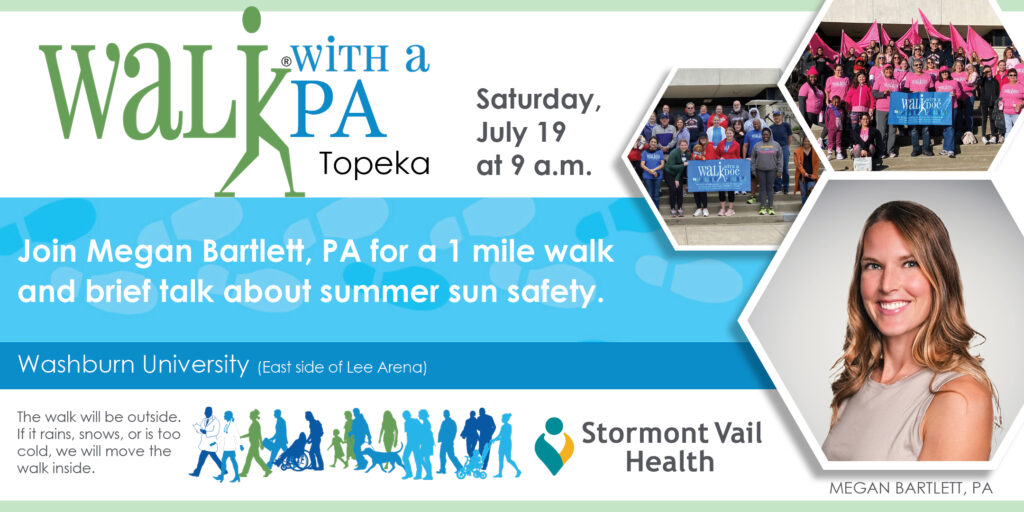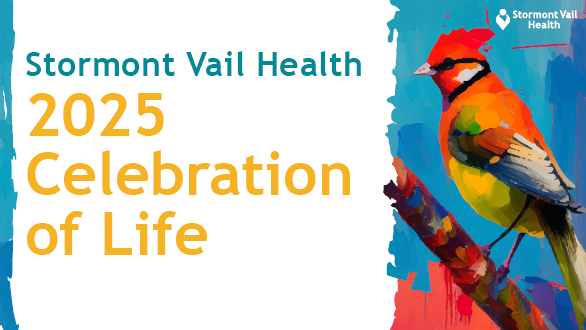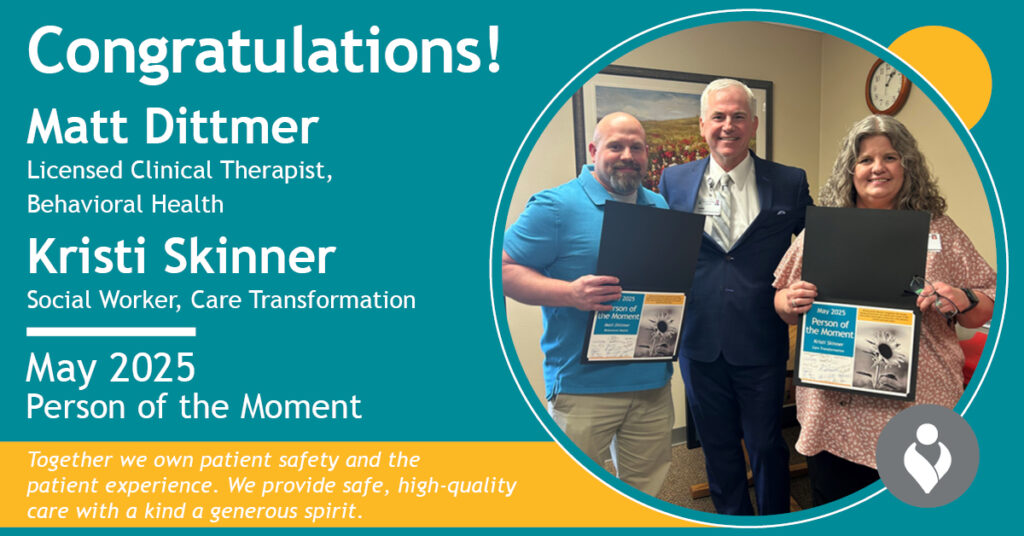Newsworthy
We Recognize Tiffany Naccarato, APRN & Advocate
Tiffany Naccarato isn’t a hat gal, but you’d never know it, given how many she wears. She’s an Advanced Practice Provider specializing in Cardiology at the Stormont Vail Health Manhattan Campus. She’s also the co-owner of Paradox Coffee & Bistro and a mother of four. On top of everything else, Tiffany is the primary caregiver for her mother, who developed early-onset Alzheimer’s at 56.
Like the rest of her collection, she never removes this hat. However, unlike the others, her advocacy influences every area of her life – from the clinic room where she helps patients grappling with dementia-related symptoms and their loved ones navigate their health to the café where she raises money for Alzheimer’s research to her home where she has rallied her family to join her in local advocacy efforts.
The Advocate
After her mother’s diagnosis, Tiffany began learning as much as possible about her mother’s condition, how to be a good caregiver, and ways to support her father. She became involved in the Alzheimer’s Association, where she champions the organization’s Walk to End Alzheimer’s events as a Walk to End Alzheimer’s Committee member. As her involvement and mother’s condition progressed, Tiffany explored more ways to expand her efforts.
“We own a coffee shop in Junction City called Paradox Coffee,” Tiffany said. “We tried to find different ways to support our [family’s] Alzheimer’s Association walk team, so last September, we ran a special on the ‘Forget Me Not,’ where we donated $0.50 from every drink to our walk team.”
Tiffany’s advocacy is a family affair. During the 2023 Manhattan Walk to End Alzheimer’s, the Naccaratos raised over $1,500 for their team and held the white forget-me-not flower during the opening ceremony before the walk, representing the hope for a cure.
“Unfortunately, our kids have had a front-row seat watching my mom’s deterioration over the years. So getting them involved [in the Walks] has been really meaningful.”
“The Walk to End Alzheimer’s is the biggest grass roots we have locally in those communities,” she added. “If you have any connection to this disease or a little place in your heart to support others, please consider joining a Walk, donating a few dollars, or helping with an event or fundraiser.”
An Era of Hope
In January 2024, Tiffany attended the Alzheimer’s Association Community Leaders Summit in New Orleans, Louisiana. During the three-day summit, she learned how to develop and use their stories to leverage their efforts and inspire community-level engagement.
“It was an incredible experience, learning about new research and treatments. For the first time in the history of fighting this disease, we could see a cure on the horizon because we’ve made such advancements.”
A few weeks later, the Alzheimer’s Association asked Tiffany to represent the First and Second Kansas Congressional Districts at the 2024 Alzheimer’s Impact Movement (AIM) Advocacy Forum in Washington, D.C. There, Tiffany and her fellow representatives will make the case to federal policymakers to back policies that would support millions of people affected by dementia-related diseases.
This year’s forum comes during an unprecedented rise in novel treatment options, which advocates such as Tiffany call the “Era of Treatment.”
“There are new treatment options available for people with Alzheimer’s at different stages that have never been available before. Getting that message across to the decision-makers in Washington is incredibly important because when you talk about insurance approving these types of treatments and getting them in the hands of everybody affected by Alzheimer’s, change has to come from the top down.”
According to Tiffany, the FDA has an integral part in working with researchers to make these new treatments more accessible to people at varying stages rather than reserving these options for those with severe dementia. In turn, it would improve access for patients in rural communities, which have historically struggled with healthcare access.
“It’s easy to get these treatments available in larger cities with more resources. But if you look at the numbers, Alzheimer’s impacts people in every community and sometimes more in greater proportion in rural communities.”
As a provider at the Manhattan Campus, ensuring rural and urban communities receive the same access is significant to Tiffany. For this reason, when she convenes with other AIM representatives on Capitol Hill in April, they’ll encourage lawmakers to understand how equal access for all communities in the Era of Treatment is essential to countering the rising Alzheimer’s epidemic.
The Alzheimer’s Disease and Related Dementias Coalition
In September 2023, the Centers for Disease Control and Prevention awarded the Kansas Department of Health and Environment $1,185,000 over five years to build public health infrastructure and increase capacity to treat Alzheimer’s disease and related dementias as part of the Building Our Largest Dementia (BOLD) Infrastructure for Alzheimer’s Act.
The funding allowed the CDC to re-establish the Alzheimer’s Disease and Related Dementias (ADRD) Coalition, which aims to revise and implement proven strategies in Kansas’s Alzheimer’s State Plan based on the CDC’s Healthy Brain Initiative State and Local Road Map for Public Health.
“The KDHE has a response plan, but it’s outdated and based on old information and data. Now that we’re in the Era of Treatment and have new information and resources available, it’s creating a statewide plan that allows us to create response teams in individual communities.”
Through these efforts, the KDHE will develop new ways to support clinicians, patients, family members, caregivers, and community support. With her personal and professional experience, Tiffany hopes to move these initiatives forward while continuing to bring her advocacy from the community to the clinic.
“I’m incredibly excited to be part of the coalition. I functioned not only as a caregiver and loved one of somebody living with this disease for the last 15 years but also as a provider who’s hopefully helped people navigate this disease process. So I hope to bring valuable information to the table and move these initiatives forward.”
The Nurse
As a healthcare professional, Tiffany believes creating networks of professionals and resources in independent communities through the ADRD Coalition would improve care quality, reduce care fragmentation and caregiver burnout, and increase timely detection and treatment.
These resources would benefit many of Tiffany’s patients and their loved ones who often struggle with questions like, “Now what?” “Where do we go from here?” following a diagnosis.
“Every week, I see several patients in the Cardiology Clinic who have some form of dementia, which means figuring out how to navigate their cardiac problems amid memory issues or relying on a caregiver to manage their care.
“My husband and I have this talk a lot. He has patients all the time who come to him with memory concerns. He can get them the testing and recommend a medication. Still, these don’t fill the gaps in all of the forms of care that are just as important, not only for the patient but in supporting caregivers’ incredible burden.”
As a provider, Tiffany seeks to ensure the patient’s entire care team understands her expectations for the patient’s health, which she does by assessing the situation from a different perspective and deciding whether there’s value in proceeding with various tests and services.
“The risk-benefit profile for somebody with Alzheimer’s looks different than somebody with full cognition. It just does. You’re making decisions differently. For example, my mother’s provider calls me every month to discuss my mom’s care, and I have to decide if she should get seen for health maintenance things, like mammograms.
“Those are decisions I never thought twice about because, as a provider, my answer would be, ‘Well, yes, she’s due,’ but then I put my caregiver hat on and realize my mom won’t understand why she needs a mammogram, to disrobe, or why she needs to go in a room with someone she doesn’t know. So then, at that point, I have to ask if we even want to put her through this.”
The Caregiver
Tiffany’s mother’s diagnosis forced her into early retirement. As her condition worsened, Tiffany’s father retired to provide around-the-clock care. Over time, she saw the first-hand effects of caregiver burnout on her father, who unexpectedly passed away in 2022.
“I don’t think he left her side for years. My father didn’t have Alzheimer’s, but I tell people that it killed him because the burden of caring for my mother stressed his body to the point that he died.”
Tiffany was eager to support her father but struggled to do so without overstepping or disrupting her parents’ routine.
“It was hard to learn to quit imparting my wisdom and perspective on his. I had to learn to meet them on their terms and stop thinking I could just come in and say, ‘This one thing is going to help,’ because it probably won’t in the way I thought it would. But every day, as I’ve learned, is a different journey, which may look the same from the outside. My mom may look stuck in this one place, but I promise you every day with her is a different adventure.”
Tiffany became the primary caregiver after her father passed. However, as her mother’s needs increasingly required 24/7 supervision, she made the difficult decision to place her mom in a memory care facility. Unfortunately, their hometown and the surrounding communities offered few options, so the Naccaratos selected a Wichita facility where she could still receive support from extended family nearby.
However, this move exposed Tiffany to the immense financial challenges Alzheimer’s patients and their loved ones face in receiving this life-saving care.
“This facility costs $8,000 a month – between my mother’s Social Security and KPERS benefit, she doesn’t even make half that. So, to make up for that difference, she needs senior resources like Medicaid. Those programs are for that, but we’re still fighting Medicaid and jumping through hoops to qualify her.”
Tiffany’s family hired an elder estate attorney to help them navigate this complex system, but many obstacles remain.
“It’s difficult for us to take her out and do anything anymore because of her disease. But when we do, Medicaid looks at every dime she spends, and they determine whether they feel that’s a valuable expense. They’ve questioned every single thing we’ve done since my dad died. ‘Why did I spend this money? Where did this go? Why did she need to go here?’ And having to explain how this woman who’s losing her mind chose to spend the money she earned appalls me.”
Tiffany and her family are just one of millions sharing the same experience.
“I can’t imagine people who don’t have the medical knowledge I have or the resources to afford an attorney to help them navigate this process. I can’t imagine how they function in this world of getting the people they love the right care and ensuring they’re cared for in their older age.
“If I have to go to Washington and tell them that the process for getting Medicaid is screwed up, then I’ll sing it from the mountaintops because there has to be an easier, more equitable process.”
“Grieving Forward”
Tiffany is no stranger to grief and anger. She understands how easy it can be to become stuck in mourning the person her mother was the previous day, month, or year ago.
“My mother is to the point now that she doesn’t know us, and we see a different version of her every time we visit. I’ve learned to accept that. I could get upset or learn to roll with it and make the best of things. That’s the caregiver’s journey every day. They get a different version every day, sometimes multiple in one day.”
Rather than letting these acute emotions trap her, she deliberately harnesses their power to “grieve forward” by advocating for her mother, patients, caregivers, and everyone affected by Alzheimer’s.
“Advocacy is cathartic. If I can make one ounce of difference in somebody else’s life as they deal with this awful disease, then maybe my journey with supporting my mother has contributed to something bigger than ourselves.”




